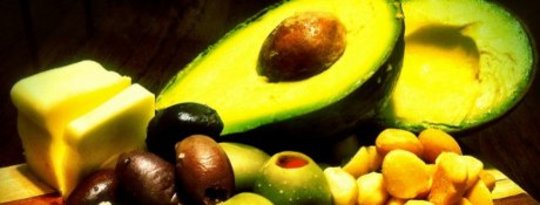
fats/oils:Lipids (or fats) that are solid at room temperature are called fats, and those that are liquid at room temperature are called oils.
Dietary fats and oils supply the body with energy; carry the fat-soluble vitamins A, D, E, and K; satisfy hunger four to five times more than carbohydrates do; provide building blocks for cell membranes, hormones, and prostaglandins; and function as a layer of insulation and shock absorption under the skin.
Much-Maligned Saturated Fats: Coconut Oil, Butter, Meat Fat
Furthermore, the much-maligned saturated fats — coconut oil, butter, and fat on meat — are not the cause of heart disease but actually protect against it. The fact is that rates of coronary heart disease, rare before 1920, have risen dramatically in the United States; since the mid-1950s, it has been the leading cause of all U.S. deaths. If saturated fats were the primary culprit, you would expect that there would be a corresponding increase in their use. However, the statistics just don’t bear this out, and in actuality, just the reverse is true.
During the sixty-year period from 1910 to 1970, the proportion of traditional animal fat in the American diet declined from 83 percent to 62 percent, and butter consumption plummeted from eighteen pounds per person per year to four. During the past eighty years, dietary cholesterol intake had increased only 1 percent. During the same period, the percentage of dietary vegetable oils in the form of margarine, shortening, and refined oils increased about 400 percent while the consumption of sugar and processed foods increased about 60 percent. (Foods, Nutrients and Prostate Cancer: A Case-Control Study in Uruguay – British Journal of Cancer.)
Perhaps the most famous example of the failure of low-fat diets is in the case of the Pritikin diet. Many who stayed on this regimen for an extended period of time developed a variety of health problems including low energy, difficulty concentrating, depression, weight gain, and mineral deficiencies. In fact, Pritikin himself committed suicide after “he realized that his Spartan regime was not curing his leukemia.”
The Health Benefits of Coconut Oil
 The heart-protective factor of coconut oil is borne out by the fact that Asian and Polynesian people who have relied on this oil for centuries have the lowest heart disease rates in the world. Saturated fats such as coconut oil also play other essential and beneficial roles in the body including immune system support, liver protection from alcohol and other toxins, and absorption of calcium by the bones. Furthermore, because coconut oil doesn’t require pancreatic enzymes for digestion, it is more quickly absorbed into the liver, where its high concentration of medium-chain fatty acids are used as fuel to produce quick energy. Coconut oil also stimulates thyroid metabolism, and several studies have shown that its use is quite thermogenic (increasing heat in the body through metabolic stimulation), and it has been used to facilitate significant weight loss in overweight and obese individuals.
The heart-protective factor of coconut oil is borne out by the fact that Asian and Polynesian people who have relied on this oil for centuries have the lowest heart disease rates in the world. Saturated fats such as coconut oil also play other essential and beneficial roles in the body including immune system support, liver protection from alcohol and other toxins, and absorption of calcium by the bones. Furthermore, because coconut oil doesn’t require pancreatic enzymes for digestion, it is more quickly absorbed into the liver, where its high concentration of medium-chain fatty acids are used as fuel to produce quick energy. Coconut oil also stimulates thyroid metabolism, and several studies have shown that its use is quite thermogenic (increasing heat in the body through metabolic stimulation), and it has been used to facilitate significant weight loss in overweight and obese individuals.
Additionally, coconut oil is the largest and most assimilable source of lauric acid — an important antifungal, antiviral, antibacterial, and antiprotozoal monoglyceride. In vitro, lauric acid has been shown to inactivate the HIV, measles, and herpes simplex viruses, as well as the cytomegalovirus. Coconut oil is therefore currently included in some AIDS and anti-candida protocols because of its potent microcidal (microbe-killing) effects.
* Because coconut oil is 92 percent saturated fat, it is extremely stable and doesn’t break down into dangerous free radicals when heated. It is therefore the oil of choice for cooking and baking.
* When shopping for coconut oil, look for a product that is non-hydrogenated, “food-grade,” and a white semisolid in cool weather (below 76°F) and a creamy-colored oil in hot weather (above 76°F).
* It needs no refrigeration and has an exceptionally long shelf life without becoming rancid (after one year of storage at room temperature, no rancidity has been detected).
Coconut Oil vs. Olive or Canola Oils
Olive oil, being a monounsaturated fat, is almost as stable and can be used for cooking and sautéing at mild to moderate temperatures. (Raw butter should also be used liberally in your kitchen, but it should be only lightly heated and not subjected to moderate or high heat.) Additionally, extra virgin olive oil is rich in antioxidants, but its longer-chain fatty acids can contribute to body fat more than the short- to medium-chain fatty acids found in butter or the tropical coconut and palm oils.
Furthermore, research published in the Arteriosclerosis, Thrombosis and Vascular Biology journal in 1998 reported that the monounsaturated fatty acids found in olive and canola oils may actually contribute to the development of atherosclerosis, and therefore heart disease, more so than saturated fat.
However, olive oil, a major component in the health-oriented Mediterranean diet, does contain a beneficial anti-inflammatory substance called oleocanthal, which can inhibit the harmful effects of inflammatory cox-1 and cox-2 enzymes in arthritic syndromes — without the side effects (ulcers, diarrhea, and bloating) of NSAIDs and cox-2 inhibitors such as Vioxx (heart attacks and strokes).
Shopping Assistance: Two of the most unrefined and purest grades of coconut oil presently available are from Jungle Products (organic and “extra virgin”) and Wilderness Family Naturals (800-945-3801). Both are available in health food stores or can be ordered from the Radiant Life Company at (888) 593-8333 or www.radiantlifecatalog.com.
Flaxseed Oil Advantages
Flaxseed oil — also called food-grade linseed oil — should also be considered a premium health food due to its high omega-3 content (57 percent). Americans generally consume far too many omega-6 essential fatty acids (found in most polyunsaturated vegetable oils) and not enough omega-3 essential fatty acids (found in flax and chia seeds, fish, eggs from free-range chickens, dark green vegetables, and walnuts).
Flaxseed oil makes a delicious salad dressing, and the oil or seeds are excellent freshly ground and sprinkled on cottage cheese, fruit, and cooked whole grains in the morning to promote healthy bowel functioning. Furthermore, flaxseeds are low in phytic acid and do not require soaking first if eaten in small amounts.
Because flaxseed oil can easily go rancid, it’s essential to buy only refrigerated, low-heat expeller-pressed organic flaxseed oil in opaque bottles.
Reprinted with permission of the publisher, Healing Arts Press,
a division of Inner Traditions Intl. www.innertraditions.com.
©2007, 2011 by Louisa Williams. All Rights Reserved.
This articles has been adapted from the book:
Radical Medicine: Cutting-Edge Natural Therapies That Treat the Root Causes of Disease
by Louisa L. Williams.
 A “radical” approach to holistic healing • Examines the root causes and cures for ailments such as Alzheimer’s disease, breast cancer, and heart attacks. • Offers cutting-edge detoxification and draining therapies to address the tremendous chemical onslaught of modern life • Explains the profound health problems caused by dental amalgams, vaccinations, antibiotics, cosmetics. A practical guide for practitioners and patients alike, Radical Medicine offers a wealth of holistic, natural therapies for overcoming what is poisoning us and our world so we can achieve optimal health and well-being.
A “radical” approach to holistic healing • Examines the root causes and cures for ailments such as Alzheimer’s disease, breast cancer, and heart attacks. • Offers cutting-edge detoxification and draining therapies to address the tremendous chemical onslaught of modern life • Explains the profound health problems caused by dental amalgams, vaccinations, antibiotics, cosmetics. A practical guide for practitioners and patients alike, Radical Medicine offers a wealth of holistic, natural therapies for overcoming what is poisoning us and our world so we can achieve optimal health and well-being.
CLICK HERE for more info or to order this book on Amazon.
About the Author
 Louisa L. Williams, M.S., D.C., N.D., received her doctoral training in naturopathic medicine from Bastyr University. She also holds a master’s degree in psychology and a degree in chiropractic. In 1984 she founded the Seattle Health Clinic, which specializes in environmental medicine and detoxification. She now lives and practices naturopathic medicine in Marin County, California. Visit her at: radicalmedicine.com or marinnaturopathicmedicine.com
Louisa L. Williams, M.S., D.C., N.D., received her doctoral training in naturopathic medicine from Bastyr University. She also holds a master’s degree in psychology and a degree in chiropractic. In 1984 she founded the Seattle Health Clinic, which specializes in environmental medicine and detoxification. She now lives and practices naturopathic medicine in Marin County, California. Visit her at: radicalmedicine.com or marinnaturopathicmedicine.com
























